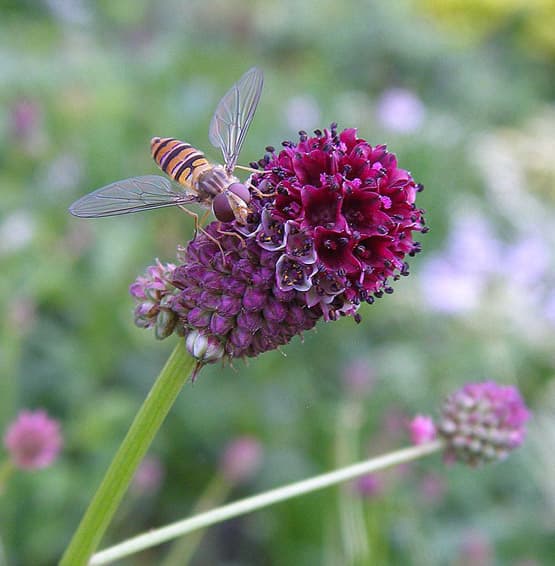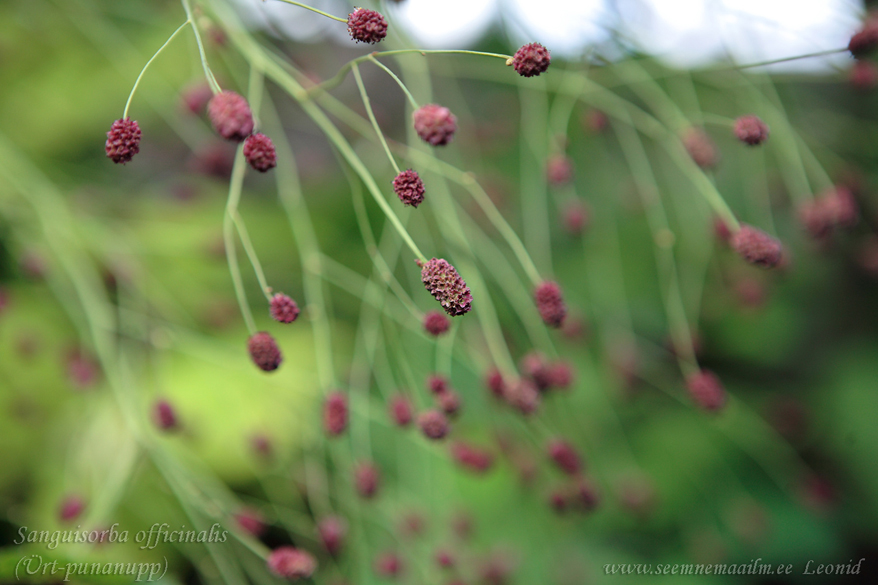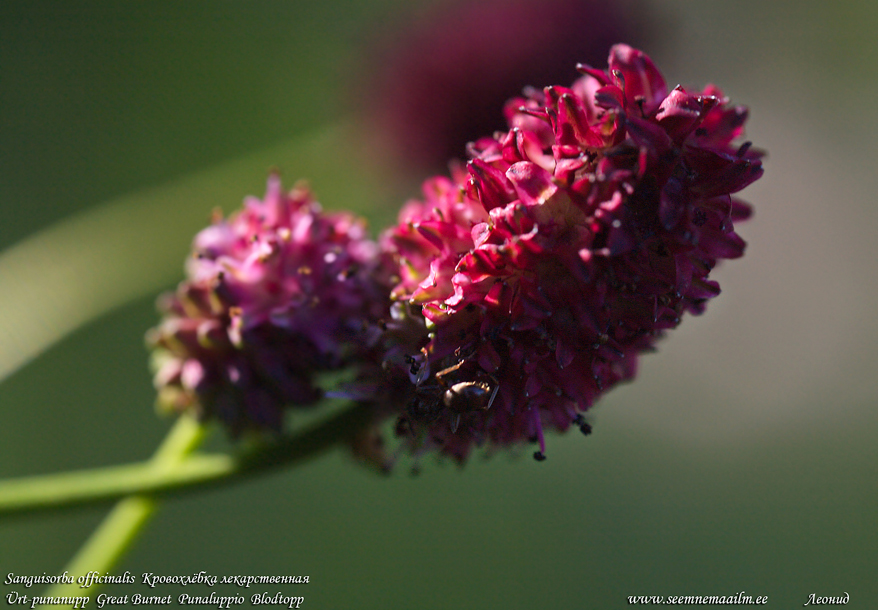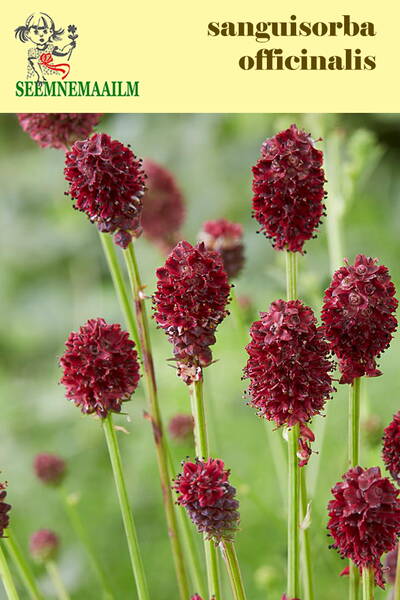Ex Tax: 1.65€
Vitamin and medicinal greens that can be grown even on a windowsill!
Perennial herbaceous plant from the Rosaceae family. The period from full germination to the beginning of economic suitability is 90-115 days. Plant 60-100 cm high.
The rosette of leaves is semi-raised. The leaf is medium-sized, green, pinnately dissected, with a folded surface, the edge is notched.
Inflorescence – head, dark pink flower. Honey plant. Blooms from June to August.
Winter hardiness zones Z3 - Z8.
1.0 g = 430 seeds.

Burnet can be grown on light sandy soils. The weight of one plant is 15-30 g. It is grown through seedlings. When sown in late April - early May, seedlings appear in 18-30 days. In the first year, the plants form rosettes of basal leaves, in the second they bloom and bear fruit.
Recommended for use as fresh leaves and dried rhizomes as a seasoning for salads, soups, drinks, as well as in the canning industry. The yield of green mass is 1.2 kg/m2.
Young burnet leaves, containing vitamin C, are used in canning. In cooking, the leaves are used to flavor salads, soups, tomato, egg and fish dishes, drinks, and cocktails. Vinegar is infused on burnet. Boiled roots serve as a wonderful side dish for meat. The roots and leaves are brewed and drunk as tea. The burnet is of great value as a forage plant.
Medicinal properties.
The rhizome with roots has hemostatic, anti-inflammatory, bactericidal and astringent effects. An antiseptic effect against Escherichia coli has been established. A decoction or liquid extract of burnet is used for gastrointestinal diseases, intestinal, uterine and kidney bleeding, stomatitis and gingivitis.
In folk medicine, the decoction is used for headaches, sore throat, pulmonary tuberculosis, indigestion, and as an external remedy for wound healing.
Agricultural technology.
Undemanding to growing conditions. Grows well on sandy, sandy loam and calcareous soils. The burnet grows in one place for about eight years.
Sowing in early spring to a depth of 2-2.5 cm. Seedlings are thinned out according to a 20x45 cm pattern.
Care consists of loosening, weeding and fertilizing. Plants are harvested during budding. After the first cutting, burnet gives a second and, under favourable conditions, even a third cutting. The cut mass is dried in the shade and stored in well-ventilated areas.


Great Burnet, official burnet, burnet bloodwort, common burnet. Bot. syn.: Sanguisorba microcephala K. Presl.
In cooking, burnet leaves are used in salads, soups, tomato, apple, egg and fish dishes, and drinks. They taste and smell like cucumbers, but with a strong astringent flavor that is perceived as nutty. Vinegar is infused with burnet.
In Yakutia, burnet rhizomes, which are thick, long, creeping, are kept frozen, then soaked in milk and boiled or fried, making a side dish for meat. Dried roots serve as a seasoning for meat and salads.
In Mongolia, burnet leaves are brewed and drunk as tea. In Alaska, collected young and fresh burnet leaves are mixed with cheese, vinegar is added to the dish and eaten in this form.
Dried burnet leaves are used as a seasoning. Sometimes in some European countries, burnet is added to beer or homemade wine.
When preparing any dish with burnet, it should be taken into account that when boiling and frying, the cucumber smell disappears, although the leaves remain tasty. In addition, the petiole of the leaf after heating becomes very hard and completely inedible, so it is better to throw it away in advance.
Young leaves for fresh consumption are collected in May-June, before the plants begin to bud. The rhizomes together with the roots are dug up in August, after the end of flowering of the plants, cleaned of soil, freed from above-ground parts and prepared fresh, frozen or dried. To get rid of excess tannins, the rhizomes should be chopped into pieces and soaked for several hours. Dry roots are stored in a closed container.
Burnet seasoning.
Pour boiling water over the burnet leaves, chop finely, add vinegar, vegetable oil, powdered sugar, salt and pepper, mix everything. Serve with meat and fish dishes. This seasoning can be preserved for the winter.
Burnet leaves - 300 g, vinegar (3%) - 1/4 tbsp, vegetable oil - 4-5 tbsp, powdered sugar - 0.5 tsp, salt and ground black pepper - to taste.
Burnet salad with potatoes.
Cut the boiled potatoes into slices. Soak the burnet leaves in boiling water for 1 minute, dry and chop together with the onion. Combine with potatoes, salt, season with herbs, sour cream and vinegar.
Potatoes - 1 pc., young burnet leaves - 10-12 pcs., green onions - 3-4 feathers, sour cream - 1 tbsp.
Salad of burnet leaves and fireweed.
Finely chop the sorted and washed burnet leaves, fireweed and any green wild onions, season with sour cream (or vegetable oil with vinegar), salt and sprinkle with finely chopped dill.
Young burnet leaves - 75 g, fireweed - 25 g, green wild onions - 15 g, sour cream - 10 g, dill and salt - to taste.
Salad of burnet leaves with sorrel, Kamchatka style.
Blanch the sorted and washed leaves of burnet and arctic sorrel for 1-2 minutes, put in a colander, let the water drain and chop finely. Combine with finely chopped wild green onions, boiled potatoes, cut into cubes, season with sour cream or vegetable oil, salt, put in a salad bowl and garnish with dill.
Boiled potatoes - 100 g, young burnet leaves - 80 g, arctic sorrel - 80 g, green wild onions - 40 g, sour cream - 40 g, salt and spices - to taste.
Tea from burnet and St. John's wort.
Mix equal parts of dried burnet and St. John's wort. Store in a sealed container. Brew like regular tea.
Kissel from burnet rhizomes.
Freeze the burnet rhizomes, chop finely, pour in milk and cook until done, chopping and grinding them during cooking. Add butter and sugar to taste. Serve cold.
For 100 g of rhizomes - 1 glass of milk.















